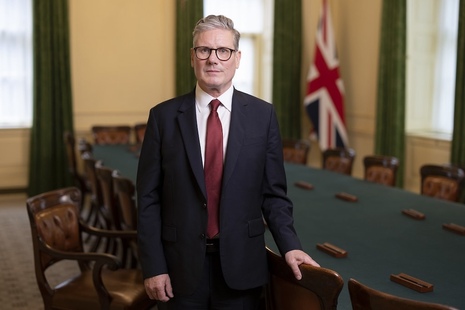The Rt Hon Sir Keir Starmer KCB KC MP

Biography
Sir Keir Starmer became Prime Minister on 5 July 2024.
Education
Keir attended Reigate Grammar School, before studying Law at the University of Leeds. He went on to do postgraduate studies at the University of Oxford, receiving a Bachelor of Civil Law (BCL) degree.
Political Career
Keir was elected a Member of Parliament for Holborn and St Pancras in May 2015. He was elected leader of the Labour Party in April 2020.
Career before politics
Keir qualified as a barrister in 1987 working in private practice before working as a legal advisor to the Northern Ireland Policing Board.
He was appointed Queen’s Counsel (QC) in 2002.
In 2008, Keir was appointed Director of Public Prosecutions, leading the Crown Prosecution Service until 2013.
He received a knighthood in 2014 for services to criminal justice.
Personal Life
Keir is married and has two children.
Prime Minister
The Prime Minister is the leader of His Majesty’s Government and is ultimately responsible for the policy and decisions of the government.
As leader of the UK government the Prime Minister also:
- oversees the operation of the Civil Service and government agencies
- chooses members of the government
- is the principal government figure in the House of Commons
Cabinet Office and Prime Minister's Office, 10 Downing Street
First Lord of the Treasury
The First Lord of the Treasury is one of the Lords Commissioners of the Treasury. This role is usually held by the Prime Minister.
Since the 17th century, the Lords Commissioners of the Treasury have collectively carried out duties that were previously held by the Lord High Treasurer (head of His Majesty’s Treasury).
The Lords Commissioners of the Treasury also include:
- the Second Lord of the Treasury - the Chancellor of the Exchequer, who has most of the functional financial responsibilities
- Junior Lords Commissioners of the Treasury - other members of the government, usually government whips in the House of Commons
10 Downing Street is the official residence of the First Lord of the Treasury, and not of the Prime Minister.
Cabinet Office and Prime Minister's Office, 10 Downing Street
Minister for the Civil Service
The Minister for the Civil Service is responsible for regulating the Civil Service.
The Civil Service (Management Functions) Act of 1992, allows the Minister for the Civil Service to delegate power to other ministers and devolved administrations.
This role was created in 1968 and is always held by the Prime Minister.
Minister for the Union
As Minister for the Union, the Prime Minister works to ensure that all of government is acting on behalf of the entire United Kingdom: England, Northern Ireland, Scotland, and Wales.
Cabinet Office and Prime Minister's Office, 10 Downing Street